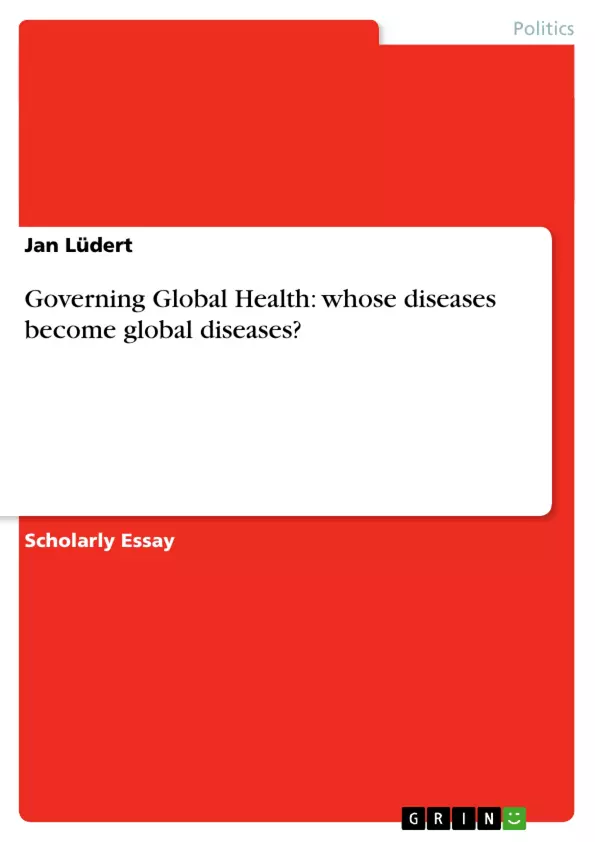In mid March 2003 the small bush airport of Maun, Botswana, the entrance to the
magnificent Okawango Delta, transformed overnight from a calm African airstrip into a
possible entry point for a major health threat. Airport staff in masks handed health
warnings of a novel and unknown disease called Severe Acute Respiratory Syndrome
(SARS) to passengers wearing khaki adventure clothing. Ministry of Health officials
questioned incoming passengers predominantly from Europe and Northern America,
about their latest travels and in return received anxious and concerned inquiries from
leaving passengers ready to board their flights back home. A feeling of vulnerability lay heavily in the air. Meanwhile, on the other side of town, in the local hospital Batswana children, women and men stood patiently in a long line, under the scorching sun to await their routine medical checkups. Every person in this line had tested positive for the Human Immunodeficiency Virus (HIV), and many are also latent or open carriers of the bacterium Mycobacterium tuberculosis (TB). No questions were asked here; overworked doctors and nurses were too busy providing basic support to the never-ending line of patients. The feeling here could be best described as accepting ones fate to die, with little hope to become eligible for a place on the antiretroviral therapy (ARV) program initiated by the government, which had commenced a year earlier.1 What remained was the perception that something profoundly different happened in the same place, at the same time. But what was it?
Inhaltsverzeichnis (Table of Contents)
- I. Introduction
- II. Conceptualizing global communicable diseases and its governance
Zielsetzung und Themenschwerpunkte (Objectives and Key Themes)
This paper examines how different communicable diseases become globalized, focusing on HIV/AIDS and SARS as examples. The paper investigates how these diseases gain global recognition, both physically and ideationally, and analyzes the perception that SARS has a more global impact than HIV/AIDS. It explores whether this perception is influenced by the interests of powerful actors in the global health realm, such as states and multinational corporations.
- Globalization and its impact on health
- The concept of global health governance
- The role of powerful actors in shaping global health narratives
- The ‘becoming global’ of communicable diseases
- The perception of SARS as a more global disease than HIV/AIDS
Zusammenfassung der Kapitel (Chapter Summaries)
- I. Introduction: The introduction contrasts the public health responses to SARS and HIV/AIDS in Maun, Botswana, highlighting the different perceptions and approaches surrounding these diseases. It sets the stage for the paper's exploration of how diseases become global and the role of powerful actors in shaping these narratives.
- II. Conceptualizing global communicable diseases and its governance: This section introduces the key concepts of globalization, health, and global health governance, exploring how these concepts intersect and influence global health issues. It defines globalization as a set of processes that change human interactions across spatial, temporal, and cognitive boundaries, emphasizing the impact of these changes on health and disease.
Schlüsselwörter (Keywords)
The paper focuses on global health governance, communicable diseases, globalization, HIV/AIDS, SARS, powerful actors, perception, and the ‘becoming global’ of diseases.
Frequently Asked Questions
How do communicable diseases become 'global'?
Diseases become global through physical spread across borders and ideational recognition, where they are perceived as threats to the global community, often influenced by powerful actors.
Why was SARS perceived differently than HIV/AIDS in 2003?
SARS was often treated as an immediate global health threat requiring urgent border controls, whereas HIV/AIDS was frequently viewed as a routine medical issue in many regions, despite its devastating impact.
What is Global Health Governance?
Global Health Governance refers to the formal and informal institutions, rules, and processes that manage health issues that transcend national boundaries.
What role do powerful actors play in global health?
Powerful actors, such as states and multinational corporations, shape global health narratives and determine which diseases receive the most attention and resources based on their interests.
How does globalization impact human health?
Globalization changes human interactions across spatial, temporal, and cognitive boundaries, facilitating the rapid spread of diseases while also enabling global cooperation in health management.
- Quote paper
- Jan Lüdert (Author), 2006, Governing Global Health: whose diseases become global diseases?, Munich, GRIN Verlag, https://www.grin.com/document/90020



